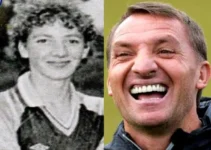Do you really know Graham Potter beyond his tactical brilliance on the field? This memoir delves into the life of the man whose journey to the top has been anything but ordinary. Let’s start at the beginning, during Potter’s early years, when he experienced the harsh sting of fan backlash. As a teenager with little experience, Birmingham football authorities unexpectedly threw him into their senior team. Unfortunately, young Graham wasn’t ready for the big stage, and his poor performances led to merciless boos from his own supporters.
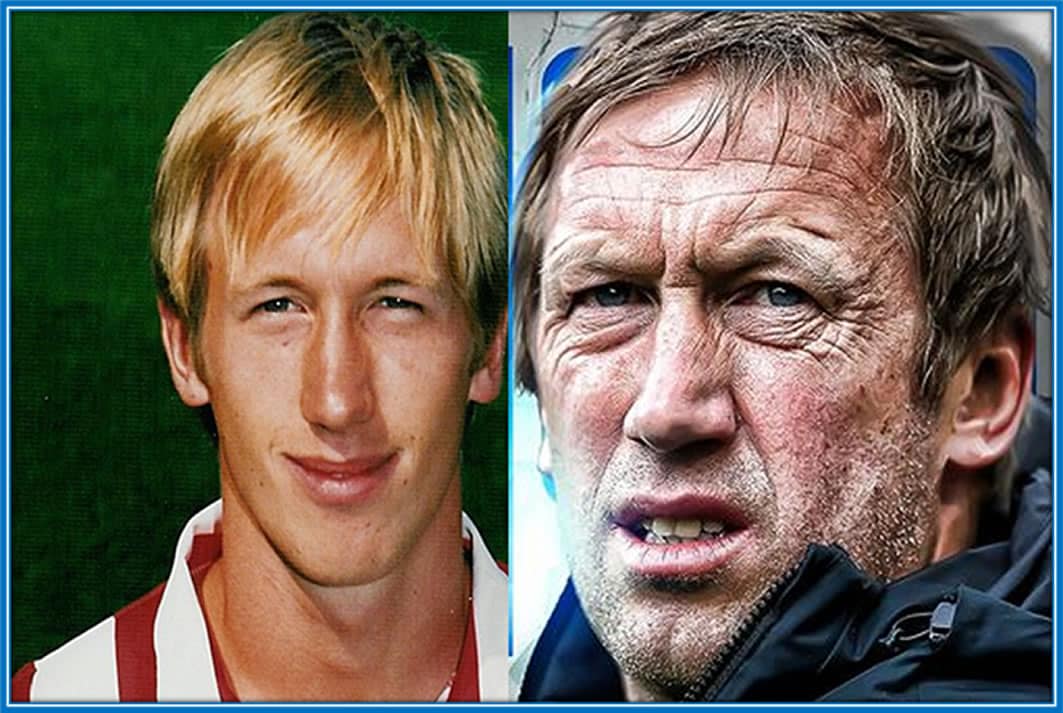
A Fighter’s Heart: Graham Potter’s Path from Rejection to Triumph
What happened in Birmingham left a lasting scar on Potter. The fans’ rejection pierced his heart and remained a painful memory. The experience of being booed so early in his career shook his love for football, forcing him to see the sport in a new light. From that moment, he knew the difficult path he had chosen, and the reality of the football world set in.
But it wasn’t just the Birmingham episode that dampened his spirits. Another club also failed to support Potter, leaving him feeling condemned to failure as a player. At one point, he questioned whether a football career was even worth the emotional toll. This inner struggle ultimately led Potter to retire, not due to injury like other famous managers such as Julian Nagelsmann or Thomas Tuchel, but because of sheer frustration. He made the difficult decision to walk away from the game at just 30 years old.
This is the story of a man once ridiculed as a “terrible player,” someone whom few believed would ever achieve success after stepping away from football. And yet, Graham Potter defied the odds. Welcome to his world, and we’re excited to share his remarkable story with you.
Preamble:
This article provides an in-depth look into the life of Graham Potter, offering a detailed account of his journey. It covers key aspects like his Childhood Story, Early Life, Family Background, and introduces important figures in his life, such as his wife Rachel Potter, his parents Val and Steve Potter, and his children.
We’ll also explore his personality and other lesser-known facts. To spark your interest, we’ve created a visual timeline, showcasing key moments from his early years to his eventual success. This is the perfect introduction to Graham Potter’s remarkable life and career trajectory.
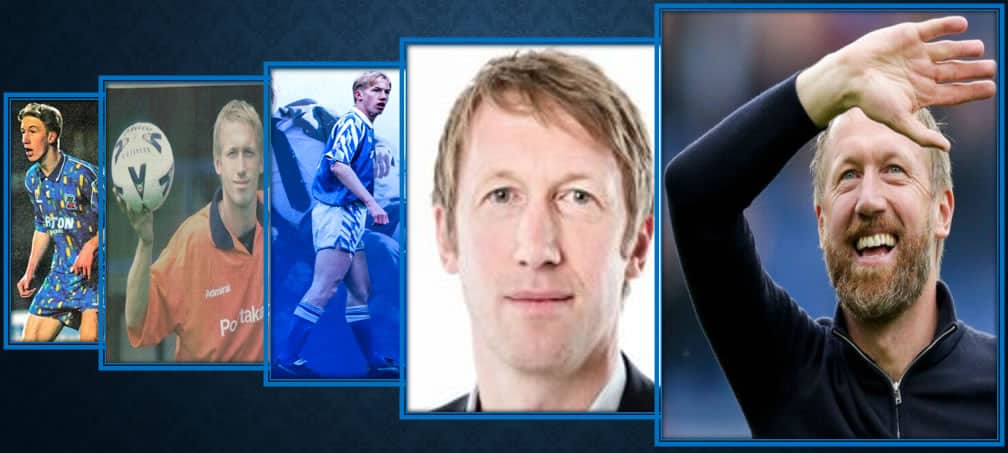
Comprehensive Biography of Graham Potter: Childhood Story, Early Life and Journey to Success.
Graham Potter Childhood Story:
For Biography starters, he bears the full name – Graham Stephen (after his Dad) Potter. The English manager was born on the 20th day of May 1975 to his mother, Val Potter and father, Steve Potter, in Solihull, United Kingdom.
Graham Potter spent his childhood years in the English West Midlands. This is the second-most populous county in England after Greater London.
Graham grew up in modest football surroundings made up of mostly Birmingham supporters.
As a child, people found him very likeable – because of his intelligence (when he speaks) and easy physical recognition.
The genetics of Graham Potter’s parents gave him that intelligence. It also nurtured his body into this tall shape, light skin, and very slender boy.
Family Background:
Solihull, where Graham Potter spent his childhood, is a market town for most middle-income earners. Graham Potter’s parents (Steve and Val) raised him in a comfortable average home.
Very supportive, Steve and Val understood what he wanted to do in life and guided him towards his goals.
As I write this Biography, both of Graham Potter’s parents are late. Starting with his Dad (Steve), he died in January 2020. Val, his Mum, died six months earlier – before her lovely husband (July 2019).
Graham Potter Family Origin:
Solihull is a large market town that holds the manager’s ancestry. Outside London, the town (largely rural) is one of the most affluent areas in the UK.
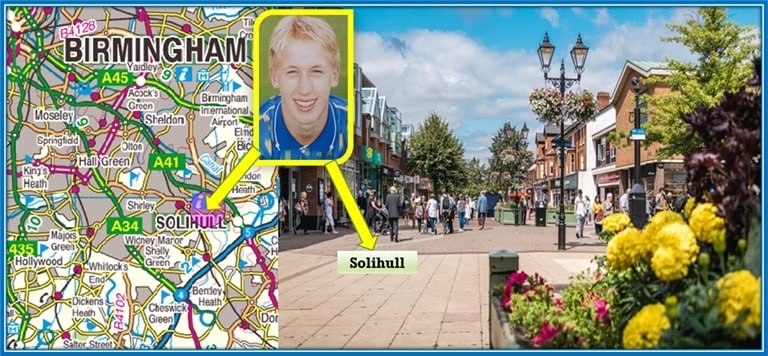
Graham Potter Family Origin – Explained.
Where Graham Potter’s family comes from (Solihull) is famed as the home of the popular Land Rover car marque. The rural town is also home to the British equestrian eventing team.
Education Background:
From the early days, Graham Potter decided he would attend a football school. Potter started out as a student trainee with Birmingham City Football Institution. As a below-average player, the youngster managed to graduate from their academy in the year 1991.
Graham Potter Biography – Career Football Story:
Being a below-average player never helped the teenager who had a difficult time beginning life with the senior team.
On several occasions, Graham Potter got booed off the pitch by his own Birmingham City fans. Similar to Ralf Rangnick, he had a tough start to his playing career.
The consequence of poor performance became one of Graham’s early torments. From the moments his own fans booed him, the boy understood the fickle nature of his professional career.
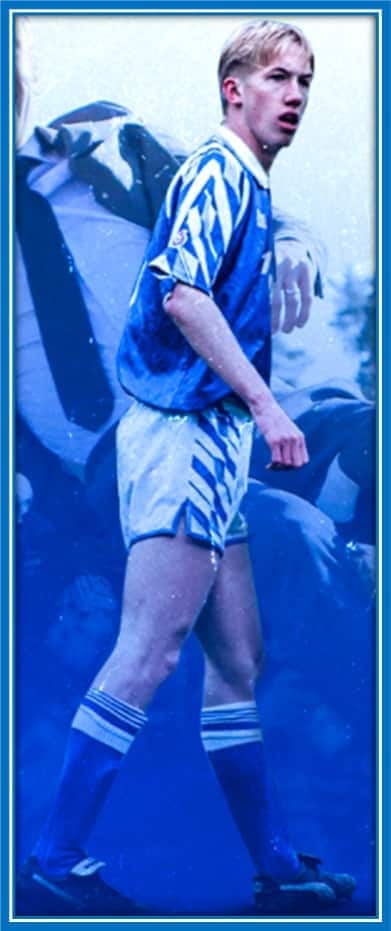
Behold. Graham Potter’s worst days as a footballer. He got ridiculed and booed by his very own Birmingham City fan.
Poor Graham observed he was too raw and unprepared to start senior football.
The entire issue started when he was thrown in at the deep end by Birmingham City management. Speaking about his early career experience, the manager said,
“It was tough; a bit of a baptism of fire. Birmingham City was fighting relegation. The ownership was changing, and the club was suffering.
That time wasn’t a positive period for a 17 years old me.
it was a bad time in Birmingham City’s football history”
After leaving Birmingham City, Graham Potter spent his next years as a pro with mid-tier teams like Stoke, Southampton and West Bromwich Albion.
The 1996/1997 season was his best year as a senior footballer who played in the Premier League.
That season, Graham Potter helped his team beat the Almighty Manchester United by six goals to 3.
That win earned Graham his first-ever England call. Mind you, they did not call him to the Three Lions, but England Under-21.
Graham Potter Retirement Story – Doing that at age 30:
Playing in the Premier League for a short time and reaching England U-21 before David Beckham was the greatest achievement Graham had in his professional career.
After he was sold to other lower-division clubs, things began going worse for Potter.
At some point, he was out of contract from York – as a League Two player. Graham Potter found himself left behind, as no club wanted to invest their money in him.
During that time, no salaries came in. The highest Potter earned was £30,000 a year – in the lower leagues.
He later had a challenging eight months at Boston United, where he played in the English football league’s bottom tier. Graham Potter had to travel for two and a half hours, which is the distance from his home to the club.
Out of frustration, he later dropped into non-League football by taking a month on loan to Shrewsbury Town.
Then, around February 2004, Graham had an opportunity to join Horton’s Macclesfield. Sadly, this club later released him.
As a footballer, Potter saw himself fading off. Most times, footballers are able to carry on as long as possible unless an injury forces them to retire.
Graham Potter’s case was different. He never waited for injury to kick him out. At the age of 30, he decided to quit football.
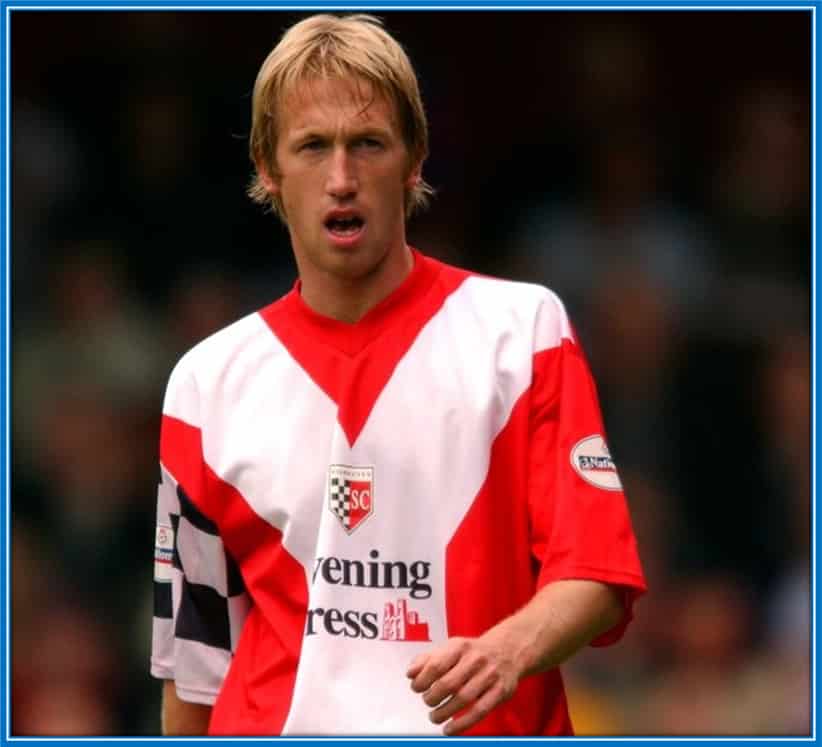
Poor Graham Potter left football so young. At the age of 30.
Life after Retirement from Playing Career:
Speaking with the Atlantic about his decision to quit his playing career, Graham once said,
“Lots of people were saying to me ‘Please Stay in the game, play as long as you can’ But I told them my decision was the right thing for me to do.
It was indeed a tough moment, though.
After quitting football at 30, I decided to take the proactive step of thinking about what I would do for the rest of my life.”
After retirement from football, poor Graham felt so emotional. Football was a massive part of his identity, and leaving it felt like a piece of him was not there anymore. Thanks to advice from his parents and girlfriend (Rachel), he finally came to terms with it.
Graham Potter Education Pursuit:
After consulting his parents and close acquaintance, the Smart thinker applied and got scholarship support from the Professional Footballers’ Association (PFA). This scholarship facilitated Potter’s graduation from Open University in December 2005.
At the time Potter completed a degree in social science through the Open University, he had already begun learning to become a football coach. In fact, the combination of football and education proved important to his future ambition.
The First Football Job:
Following University Graduation, Potter began working as a football development manager for the University of Hull.
So humble as a man, he accepted a £17,000 per year salary – which he used to fund his education and take care of his new family.
Graham said while speaking about the preparation for his first football job,
I always remember the process i went through to get an interview.
The job was a graduate position. To pass, I had to demonstrate my understanding of football.
The job came at the tight time, when i had no monies.
I had stopped playing football and needed something to keep my family going.
It is pertinent to note that Graham had just married his wife – Rachel Potter – when he got the £17,000 per-year job.
Thankfully, he has a humble partner who also worked to help with his little income. Graham Potter’s wife, Rachel, understood his situation and stood by him.
Managing Ghana Women’s Football:
Two years after his first job, Graham Potter got another. This time, he got employed as the Technical Director of the Ghanaian women’s team.
That year, 2007, the Ghana women’s team qualified for the 2007 Women’s World Cup finals in China.
We did some work with the Ghanaian FA during my time with the University of Hall. That’s how the job came about.
Potter explains. He used his little experience while working at the University of Hull to help the women’s team.
It was an enjoyable learning experience finding himself in a World Cup with players from different cultures and origins.
The Ghana job was also a challenge for Potter, as he spent six weeks away from his wife and family.
Sadly, in that tournament, Ghana lost all three games. Not bothered about the loss, Graham used that as a way of gathering experience.
Acquiring a Master’s Degree – Leeds Metropolitan University:
Following the 2007 FIFA Women’s World Cup, Graham Potter decided to step down from his role. He then took on a position as an assistant coach with the England Universities squad. This experience sparked his interest in furthering his education, leading him to a quest to pursue a master’s degree program.
Potter took charge of the football team at Leeds Metropolitan University. Then, he studied for a Master’s degree in leadership personal and professional development.
Research has shown that he finally became a master’s degree holder in leadership and emotional intelligence.
The years spent in the University sector were great for learning and practising for him. Potter managed a team that was in the ninth tier of English football.
According to him, crowds were a handful, and maybe 100 — 200 people attended a match if you were very lucky.
University football is an environment in which you could make mistakes, which I did. But it was quite a safe learning environment and a brilliant time for me.
Journey to Fame Story:
The young manager enjoyed making academic and football thirsts join forces. This defines his activities in his early 30s – when he coached in England universities.
After acquiring his Master’s degree, Graham Potter decided to apply for bigger coaching jobs.
Surprisingly, the choice of his first non-university coaching job remained a shock to many. While most young managers from England would prefer to start with a low English team (in England), Potter chooses the strangest of places.
In December 2010, Potter took the bold step of moving his family to his new workplace, a skiing town in central Sweden. He was to take charge of one of Sweden’s most hated clubs that had just been relegated from their third league tier.
That month, December 2010, Potter signed a three-year contract as manager of Östersund. This is a club that plays in the fourth tier of Swedish football. Now, how did Potter get the Swedish coaching job?
The job offer came through one of his friends, Graeme Jones, who is the assistant to Roberto Martínez at Swansea City.
He recommended Potter to Östersund’s chairperson, Daniel Kindberg. After an interview (where he liked his person), the job came his way.
Graham Potter’s Sweden Story – The Arrival:
Charley, his eldest son, was just 11 months old when he got the Östersund job. Graham Potter’s family (his wife, Rachel and son) all had English clothes on when they arrived on the flight at Sweden’s airport.
Reaching there, they observed the temperature to be (minus 20 degrees). Immediately, Rachel Potter requested blankets to make sure everyone was warm enough.
Graham couldn’t go outside until the middle of February to begin his job because it was too cold.
After his first day at work, Graham discovered that Nobody really liked the club. In fact, he also noticed that there was almost zero real support for the club. This is partly because of some anti-foreign influence the previous management had.
Graham Potter also saw that a lot of the players had come on short-term contracts. And the lack of meeting players’ contract demands contributed to the lack of players’ morals and the club’s failure. Finally, there were lots of negativity flying around.
Östersund Success Story – Tripple Promotions from Swedish fourth tier to the Europa League:
A revelation came one that made him believe it is better to be in the ninth tier of English football than the fourth tier of Swedish football. This was how Graham Potter saw the Östersund situation.
Potter, upon full resumption, met the club’s chairman, and philosophically, they connected well. He brought his idea of what he wanted to do differently for Östersund. Potter insisted on creating an environment that would make his team play a certain type of football.
Putting his thoughts into action, he showed his willingness to embrace and adapt to new challenges. That made Ostersund keep on winning. Under Graham Potter, the club got promoted three times, even winning the Swedish Cup.
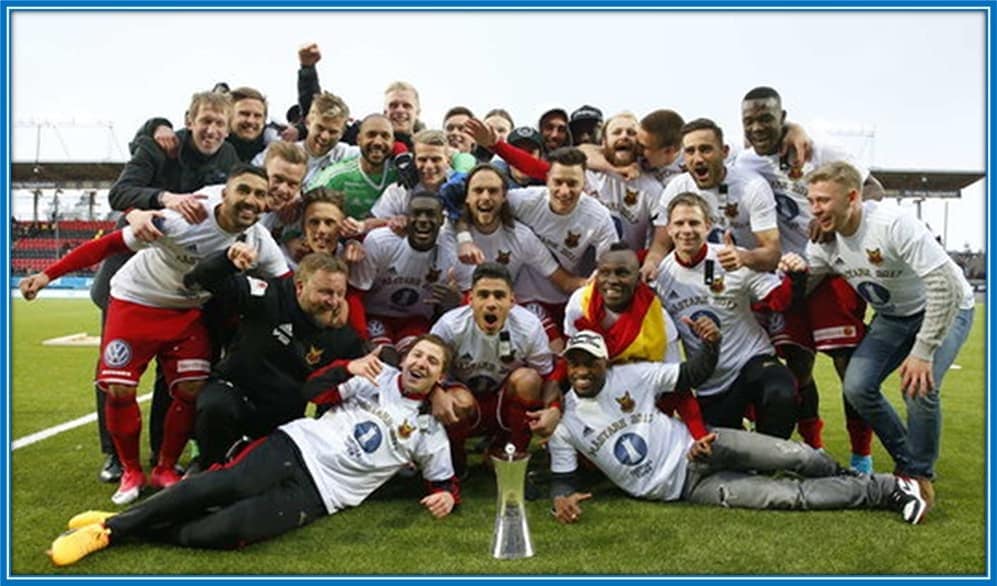
The young English manager celebrates with Östersund players as he helped them win a trophy.
More importantly, Potter qualified the team for the 2017/2018 Europa League. That season, Ostersund upset some popular European names like Galatasaray and Hertha Berlin — to win a group that had the likes of Athletic Bilbao.
In the knockout stage of the Europa League, Graham Potter’s team met an English club – the Almighty Arsenal.
In case you haven’t watched the highlight of that match, THIS IS IT. Graham Potter’s Östersund defeated Arsenal in the Emirates, their own soil.
After the match, Graham Potter’s men celebrated like they had won the Europa League – in front of their small visiting fans in Arsenal’s stadium.
From that day, news began going around, and people started asking… Who is Graham Potter? The English manager abroad.
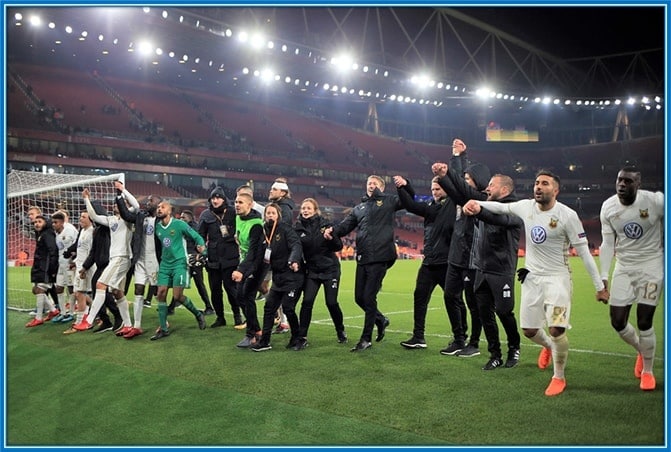
What a feeling after beating Arsenal.
Graham Potter Bio – The England Success Story:
Plaudits around England praised him for his “slick passing style of play” and ability to manage a very low-budget team like Östersund.
In Sweden, Graham Potter conquered football. He made Östersund (a fourth-division team) earn three successive promotions.
After becoming the best manager in the whole of Swedish, Potter, at this point, felt the need to move on to a much bigger challenge.
He had a tearful return to the UK. It wasn’t a straightforward decision to leave a club that worshipped and carried him always – as their true hero.
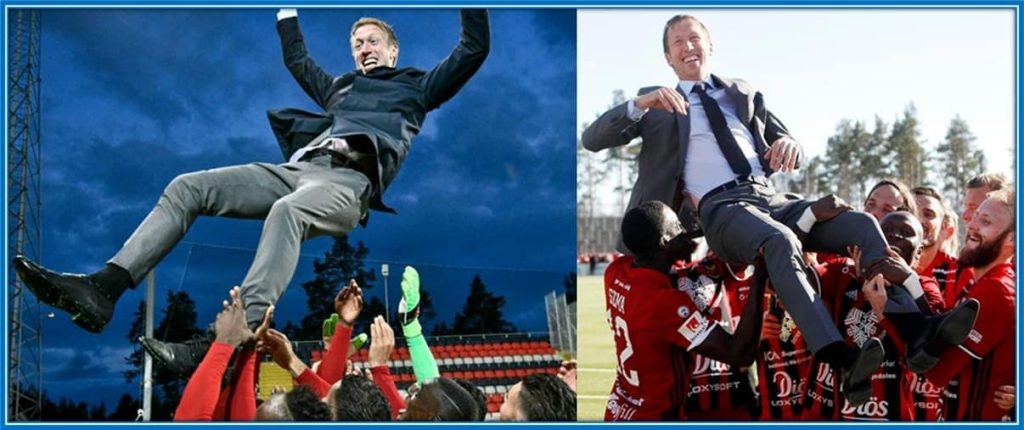
The English professional football manager sure knows how it feels to be loved.
Speaking about the experience of leaving Östersund, Potter said,
Stopping playing football at the age of 30 was a tough one, but leaving Ostersund was even more traumatic – even to my family.
It upset my eldest son. He cried about leaving his school. My wife was really happy living in Sweden.
The trust is, Potter – who is just human – also shed a tear. Sweden became his home and a special place for his family. The decision to leave that town that gave him fame wasn’t easy to handle.
Graham Potter Swansea Story:
Potter’s success story with Östersund – including beating Arsenal in the Europa League, earned him a managerial appointment with Swansea City. A club that holds a reputation for attractive football under Roberto Martinez, Brendan Rodgers and Michael Laudrup.
While at Swansea, Potter overhauled a squad he called too expensive. He developed a young team that played with great panache. His key, Daniel James, ripped through opponents, and his big striker, Oli McBurnie, scored 22 league goals, to the delight of fans.
That 2018/2019 season, he led the club to the quarter-finals of the 2018–19 FA Cup, where they hosted Manchester City. In that match, Potter initially led the Premier League champions 2–0 after just 30 minutes.
However, three late goals in the last 20 minutes brought the Potter’s siege to an end. One from Bernardo Silva, an own-goal mistake from Swansea and a late winner Sergio Agüero defeated Potter’s side – narrowly.
Even at that narrow Pep Guardiola defeat, the Swansea manager received lots of praise from football fans. Much domestic success and having the will to tactically challenge Man City later earned Potter the biggest job of his career – to manage a Premier League club.
Brighton & Hove Albion Success Story:
The job Potter did at Ostersund and Swansea transformed his profile and opened a pathway for him to work in the Premier League. After leading Swansea to a quarter-final place in the FA Cup, Graham Potter got the job as the manager of Brighton.
In the later EPL seasons, Potter successfully guided the Seagulls not just away from safety but also finishing in decent Premier League places. On several occasions, defeating big teams in the top six using low-budget players surely makes him an England manager in the making.
In fact, Graham Potter’s highly intelligent managerial style made BBC Sport publish an article about him in October 2021. It speaks about his journey and rise as a manager and also regards him as a possible England manager to replace Gareth Southgate.
Using a team like Brighton to achieve EPL success truly requires a diverse array of talents. His possession-based approach of Potter has made him become one of the best in modern football management. The rest of the manager’s Biography, as we say, is how history.
About Rachel – Graham Potter’s Wife:
There is a global saying that behind every successful man in Football comes a glamorous WAG or Girlfriend. For Graham Potter, there has been one woman who stood by him throughout. She, a former girlfriend, now his wife, is no other than Rachel.

Meet Graham Potter’s Wife. Her name is Rachael.
The Marriage and Divorce on the Same Day:
Beautiful Rachel Potter began dating Graham during his active career days. Are you aware?… Graham Potter got married to Rachel the same day York City Football Club announced that they had released him. What a bad way to treat a newly married man!
During that time, his playing career was already down the drain – with zero hopes about his continuing football for long. In fact, that wedding between Graham and Rachel, on May 31, 2003 (the day he got released by York), is a day he would never forget.
Facts about Rachel Potter:
First thing first, she is a woman who feels at ease (no pressure) with her husband – even in the face of disappointments. Did you know?… Graham and Rachel’s first dance on the day of their wedding is a song titled;
‘By the way, I’m unemployed!’.
Rachel is someone who truly understands the meaning of dating a poor footballer/manager and then, helping him become successful.
She also believes that getting married to a top English manager comes with understanding new territories.
Graham Potter’s wife – Racheal, over the years, has made sacrifices for him- even though it means putting her own life on hold.
For example, she left her Pilates business, including everything, behind – to live with her husband (for eight years) in Ostersund, Sweden.
Graham Potter’s Children with Rachael:
The marriage between the couple have produced more members to the family. As I write this Bio, Rachel and Graham Potter, have three children together. Their first child, Charlie Potter, was born in early 2010.
When Graham Potter’s family lived in Östersund, he and Rachael (in 2014) welcomed a set of twins to their family. Pictured here, their names are Theo and Sam Potter. Behold the beautiful family – during their days in Sweden.

Graham Potter holds one of his twin children – and Charlie, his first son. Rachel is with the other twin. The twin kids bear the name – Theo and Sam.
Personal Life:
He is extremely studious, highly intelligent and a deep thinker. Potter is quiet, not loud by nature, can be funny with his jokes, and keeps good company.
He behaves like a genius school teacher even while talking to his players. That’s why he is very much loved.
The Personality of helping people with low income:
Away from everything football, there is just something you might not know about Graham Potter. Now, this image of the Brighton manager explains something about his personality.

Graham Potter’s personal life – EXPLAINED.
Some Premier League managers use the international break to go on brief holidays, whilst others use it to spend more time with their families. This man, Graham Potter, is different.
When on holiday, the football manager spends a good part of his time raising awareness of the people experiencing homelessness. Graham Potter, a man dedicated to the people experiencing homelessness, took his car, then drove to their location, made his shelter and delivered charity. He has a heart similar to Marcus Rashford.

What a man Graham Potter is! He cares not only for himself but also for the people experiencing homelessness.
Graham Potter Lifestyle:
The English football manager – right from his early days – has never been the social type. It is fair to say Graham is the opposite of Jose Mourinho. He never gives self-satisfied talks about himself or managerial achievement.
Put simply, Potter lives a simple Lifestyle. It is one that is centred more around his family and his football job. The football manager understands that Family time is quality time. He gives his wife undivided attention, and that helps build a stronger emotional bond.

The England Manager’s Lifestyle – Explained.
Graham Potter Family Life:
The persons who brought him to this world were his primary source of learning. When Birmingham fans booed him during his early career days, Graham Potter’s parents ensured he never dropped his positive energy. Today, he is glad to have conquered many things.
We’ll use this section to throw more light on Graham Potter’s parents (Val and Steve), who are unfortunately late. Let’s begin with the woman who gave birth to him.
Graham Potter’s Mother:
The Brighton manager was very close to Val, his Mum, before she died in July 2019. Graham never opened up to his fans about the loss of his late Mother, as he was really mourning for months. He, however, opened up during the Coronavirus break of 2020.
Speaking about the death of his Mum, the then 45-year-old said,
‘I have to deal with it at some point.
so this lockdown is a time to do that.
at least, a time to grieve and process what had happened to my mother.
I needed this break.
Sometimes we football lovers get carried away in this inhumane world – just like we have to be some sort of robot.
As the Brighton Manager made those emotional words, little did he know he was going to lose another parent in a matter of weeks. Poor him!!
Graham Potter’s Father:
During his press conference at Brighton’s training ground in January 2020, the Manager expressed sadness, disbelief, and a lack of concentration. Unknown to everyone (even the reporter), Graham had just lost the other of his parents – his beloved Dad.
For being not his usual self that day, it took the efforts of reporters to ask if anything was wrong with him – on a personal note. That was when they found out about Graham Potter’s father, Steve. Before that, the manager has never spoken about his parent in public eyes.
Without the knowledge of anybody, the Brighton manager (before the press conference) had just taken a phone call where someone broke the news that his father, Steve, had died. As a man of robust inner strength, he was strong enough to attend that interview.
Untold Facts:
In finalizing this biography, we are going to use this section to tell you more about the celebrated British football manager. Without wasting any further of your precious time, let’s begin.
The Unconventional Coaching Methods:
Östersund footballers and staff who were under Potter will always testify about his weird approach to management. Back in the day, the English manager allowed his players and team staff to engage in community activities – that are so unrelated to football as a sport.
One of such includes making them (both players and staff) perform in theatre and music productions. All Potter wanted was for them to come out of their comfort zones. In the end, the whole idea worked. The boys of Östersund just kept winning matches.
Explanation of Graham Potter’s Tactics:
The act of creating system flexibility, dominating possession, building from the back, using mobile forwards, plus overloads. These are the fundamental components of the manager’s philosophy. Watch Graham Potter’s Östersund Tactics – which conquered Swedish football.
The issue with Pep Guardiola:
The Man City boss is, no doubt, one of the biggest influences on the way Graham Potter sets up his teams to play the game. One day, Guardiola had a furious clash with Graham Potter after his Man City side 3-2 loss at the Amex.
Goals from Leandro Trossard, Dan Burn, and Adam Webster gave Brighton all three points against Man City. After the win, a disgruntled Pep Guardiola was caught arguing face-to-face with Graham.
After investigating why the Manchester City manager got frustrated, we noticed it could be because of the way Potter celebrated one of Brighton’s goals. Here is what Pep describes as a disrespectful celebration.
Graham Potter’s Religion:
The English manager was born and raised in the Christian faith. Upon his birth, Graham Potter’s late parents (Val and Steve) gave him the Christian middle name – Stephen. That validates his Christian identity. He is someone who hardly displays his faith publicly.
Conclusion:
Dear readers, we hope our version of Graham Potter’s Biography explains his journey to the top. His road to fame has been so unconventional, just like his training methods. While writing, we noted many key moments that shaped Graham Potter’s history.
After graduating from the academy, Graham (not ripe for senior football) was tossed into Birmingham’s first team – who were fighting to survive. A poor performance made his own fans boo him. That (painfully) made Potter see his football career differently.
The best of his playing days came when he scored against Man United, a feat that gave him an England U-21 call. Following that, Graham’s career went down – even to the bottom of the English league system. He got released on his wedding day and quit football at age 30.
After his premature retirement, Potter went into coaching universities’ football teams as well as studying. After obtaining his first and master’s degrees, the manager felt the need to start a bigger coaching job. Thankfully, a friend connected him to Sweden.
Graham Potter’s wife (Rachel) and first son (Charlie) endured a tough start to life in Sweden. Thankfully, they got over it. In his first-ever foreign coaching job, Potter worked miracles at the Swedish club Östersund.
Moving Östersund from the Swedish fourth division to the first brought him fame. Potter competed in the Europa League, won group stages, and used Östersund to beat Arsenal. Such achievement brought him to England, first to Swansea and then to Brighton and Chelsea. As of now, Graham Potter is reportedly “ready” to return to football management. Rumours suggest he is a strong contender to succeed Gareth Southgate as the next England manager.
Appreciation Note:
Thanks for taking the time to read our version of Graham Potter’s Bio. We take pride in providing accurate and detailed stories about football managers, just as we have done with profiles of leaders like Bournemouth’s Andoni Iraola, Liverpool’s Arne Slot and Chelsea’s Enzo Maresca. Kindly contact us if you see anything that doesn’t look right in this memoir. And stay tuned for more of our Life Stories.

